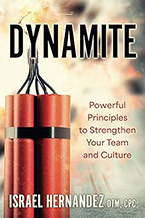February 9, 2024
Dynamite:
Powerful Principles to Strengthen Your Team and Culture
Israel Hernandez
Aviva Publishing (2023)
ISBN: 979-8-89238-741-5
New Book Reveals How to Build a Dynamite Team Through a Dynamite Culture
 Israel Hernandez’s new book Dynamite: Powerful Principles to Strengthen Your Team and Culture offers straightforward and valuable advice on how to create a team that will take your business to new levels of success. This book, the first volume in Hernandez’s planned Dynamite series, is centered on four simple principles—the importance of leadership, accountability, culture, and team building in creating a successful organization. A chapter is devoted to each principle, and besides the discussion of the principle, Hernandez shares personal stories of his business experiences, plus exercises for readers to apply what they have learned.
Israel Hernandez’s new book Dynamite: Powerful Principles to Strengthen Your Team and Culture offers straightforward and valuable advice on how to create a team that will take your business to new levels of success. This book, the first volume in Hernandez’s planned Dynamite series, is centered on four simple principles—the importance of leadership, accountability, culture, and team building in creating a successful organization. A chapter is devoted to each principle, and besides the discussion of the principle, Hernandez shares personal stories of his business experiences, plus exercises for readers to apply what they have learned.
Hernandez has worked in the hospitality and customer service industry for more than thirty-five years. He began by working in his mother’s taco shop and learning about leadership from her. Since then, he has worked in numerous restaurants in various roles and also operated his own business and served as a consultant to others. The advice he shares is based on his observations of the many leaders he has worked under and beside and his experiences training teams and leaders.
Hernandez believes the biggest issue with many organizations is that they lack principles and standards. Too often, they default to hard “Do this” and “Don’t do that” rules that turn their businesses into prisons. Instead, by focusing on the four principles he shares in this book, the organization, its leadership, and its team members can “undergo transformative growth.” The book is primarily written for leaders and organizations to help them create visions for themselves as leaders and for their culture. As Hernandez states, “A strong leader creates a dynamite culture.” Hernandez’s intention is for the book to give leaders a head start in creating that dynamite culture without all the headaches and struggles he’s experienced.
Throughout the book, Hernandez shares various lists of items integral to the discussion. In talking about leadership, he provides six critical characteristics that set great leaders apart from weak leaders. He then discusses each characteristic. For example, in discussing integrity, he reminds us of what one of his mentors once told him: “Someone is always watching your integrity to see if they believe you or not. Honesty is always the best policy.”
In conjunction with integrity is the importance of consistency. Too often, Hernandez has worked with leaders whose leadership skills were “like day and night. One day, their leadership was on point, and the next, it was a complete disaster.” He discusses how inconsistent people are not leaders. In fact, they are mostly concerned about power and their own image.
Leaders who are inconsistent are also immature. They tend to “demean, control, not trust, and take all the credit.” Hernandez has witnessed teams be destroyed by such behavior.
All that said, Hernandez does not believe in a one-size-fits-all form of leadership. He realizes different leaders will lead in different ways, so they must experiment to find the way that best suits them.
In discussing the book’s second principle, accountability, Hernandez discusses how accountability will foster the trust and integrity needed by leaders and organizations. Accountability “promotes transparency and encourages ethical behavior, reducing the likelihood of fraud, corruption, or misconduct.” Perhaps most importantly, accountability promotes a culture of continuous improvement, one where people feel safe and able to trust each other. Then they are more inclined and prepared to work together to achieve organizational goals.
Leaders can model accountability by admitting to their own mistakes, making amends, and improving their actions. Team members will then be inspired to do the same thing. Hernandez points out that the number-one reason people leave their jobs is a toxic workplace. Accountability ensures toxicity has no place in the organization.
The third principle, culture, is strongly tied to leadership. The leaders must create a culture where collaboration, innovation, and inclusivity exist. They do this by modeling what they envision the culture to be for their team. They also promote it by encouraging a growth mindset and continuous improvement for their team members. Finally, they make sure everyone feels their role is important so everyone becomes a team player.
A positive culture is closely tied to the fourth principle, which is team-building. One of the best parts of this discussion was Hernandez’s suggestions for how to recognize team members and build worthwhile reward programs to make team members feel truly appreciated. As Hernandez has learned from personal experience, a twenty-five-dollar gift card to Starbucks isn’t going to cut it for a month of extra-hard work.
Overall, Dynamite is filled with nuggets of hard-earned wisdom and advice, plus realistic applications to help your organization improve. The book is short and to the point, but jampacked with valuable information that you will want to return to again and again. Get out your highlighter and be prepared to set your mind on fire. It might even just explode because this book is dynamite!
For more information about Israel Hernandez and Dynamite: Powerful Principles to Strengthen Your Team and Culture, visit Amazon.

